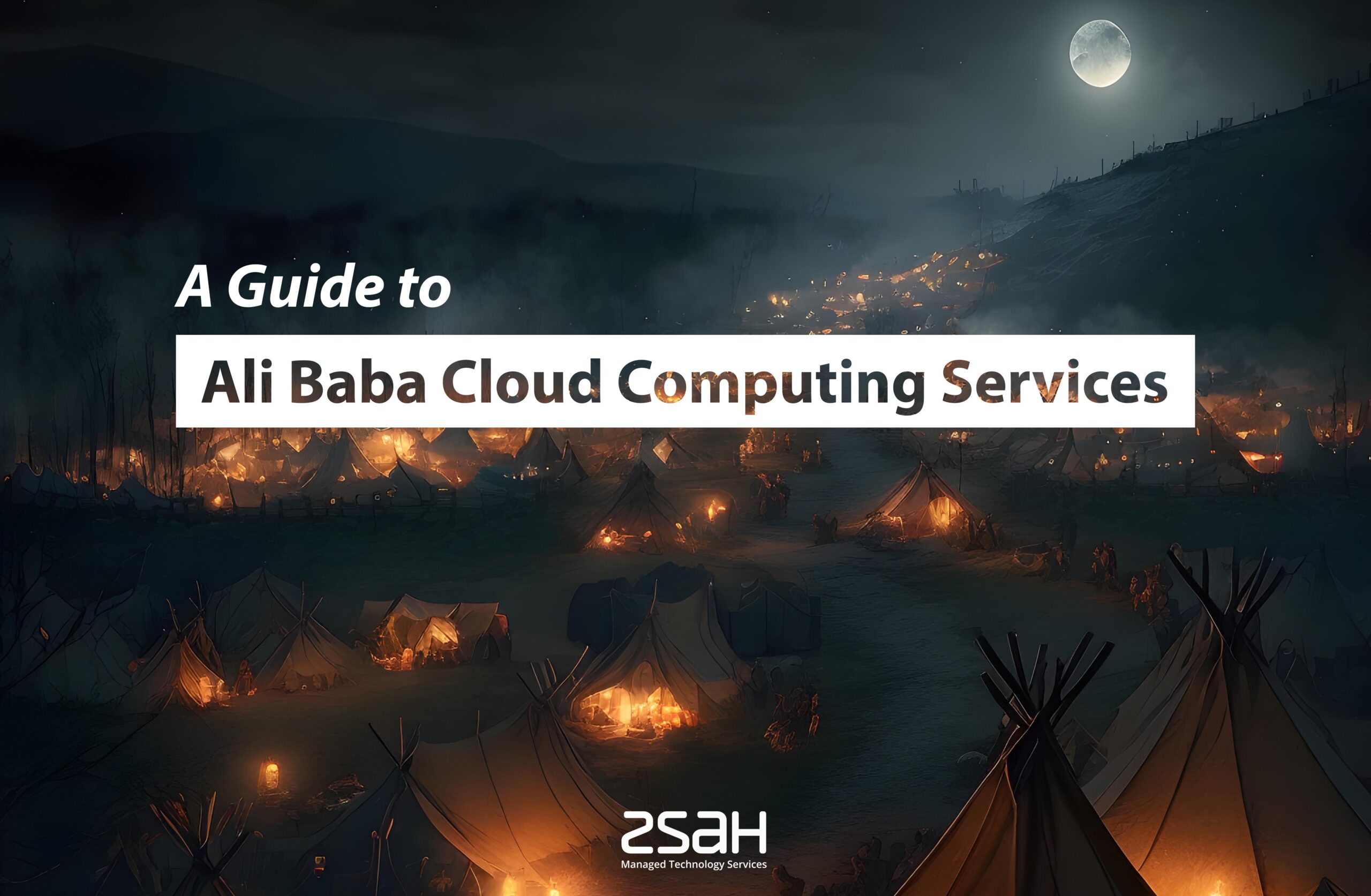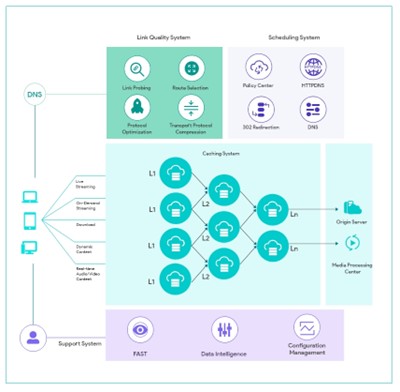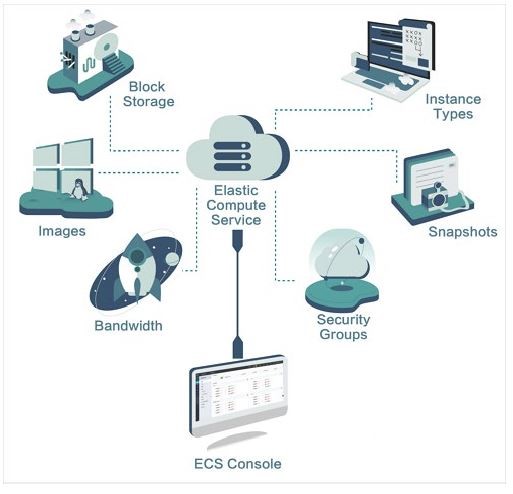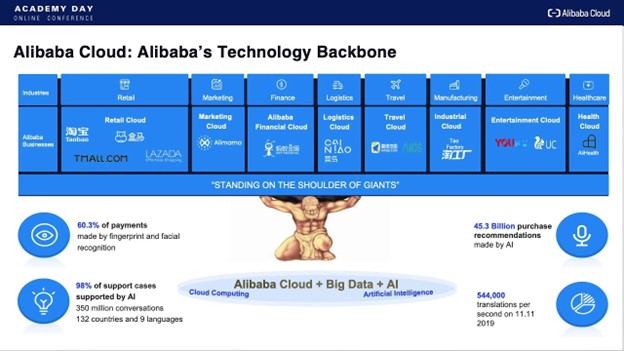A Guide to Alibaba Cloud

Alibaba Cloud may be a name you don’t hear as often as the likes of Amazon Web Services (AWS), Microsoft Azure, or Google Cloud Platform (GCP). However, the China-based technology hub is very much on a par with the big three “hyperscale” cloud service providers.
In relation to the global economy in cloud services, Alibaba Cloud currently ranks at world number four, with a 5% market share behind Google Cloud Platform (11%), Microsoft Azure (21%), and Amazon Web Services (34%).
Alibaba Cloud has achieved this position by keeping its service focus local, while setting its marketing sights to a much wider radius. According to the company itself, Alibaba Cloud is committed to “facilitating digital transformation and opening up the Chinese market for many businesses.” At the same time, Alibaba Cloud is acting as a gateway for organisations looking to reach the wider marketplace of the Asia Pacific region (APAC) as a whole.
It is doing this with a platform of cloud services and technology tools that can readily match the offerings of its bigger-name competitors. For example, the Alibaba Cloud channel ChinaConnect offers advice and support for international companies spanning a range of industries and business units that are doing business in China. It covers everything from website hosting and online payments to offline logistics and ICP registration. Other markers that enable Alibaba Cloud to stand out in the marketplace include its role in powering major shopping festivals, developing innovative payment methods, and facilitating big data analysis.
Alibaba Cloud History
Alibaba Cloud is the cloud computing arm and business unit of the Alibaba Group. From a corporate headquarters in Hangzhou, China, Alibaba Cloud was established in September 2009 as Aliyun. Offering highly scalable cloud computing and data management services, Alibaba Cloud has since grown since to become China’s largest public cloud service provider.
Alibaba Cloud Content Delivery Network (CDN)
The Alibaba Cloud Content Delivery Network (CDN( reduces the physical distance between server and user to minimise delays while loading web content. To facilitate this, Alibaba Cloud CDN endpoints are positioned as widely around the world as possible.
[Image source: Alibaba]
Requests are forwarded to edge nodes based on the access point or each request. A cached resource which has already been cached on the edge nodes is immediately returned to the client if it is already available on the edge nodes. Any requested resource which is not cached on the L1 or L2 nodes is redirected back to the origin server.
Alibaba Cloud is one of a number of business units that make up the Alibaba Group, which has an activity set that spans commerce, cloud computing, digital media, and innovation. Notable components of this group include the global consumer marketplace, AliExpress, and the mobile and online payment platform, Alipay.
Boasting the most advanced cloud network in Mainland China, Alibaba Cloud’s infrastructure includes seven data centres and over 1,100 CDN nodes. The Alibaba Cloud platform provides a full ecosystem of products that support different aspects of business, providing access to China under a single global account.
Alibaba Cloud Components and Resources
[Image source: Alibaba]
The Alibaba Cloud portfolio consists of a comprehensive selection of products that offer large-scale computing, storage resources, and big data processing capabilities. They include the following.
Elastic Computing
Alibaba Cloud’s Elastic Compute Service (ECS) offers elastic and secure virtual cloud servers with on-demand resource adjustment. Users can expand disk capacity and increase bandwidth in line with business growth at any time, or scale resources down to save costs.
Other resources available within the Alibaba Cloud Elastic Computing offering include ECS Bare Metal Instance (an elastic bare metal computing service), an Elastic GPU Service for parallel computing, Elastic Container Instance (ECI), a serverless container instance service, and Elastic Block Storage (EBS), which is a high-performance, high-reliability, and low-latency block storage service.
There’s also a public computing service offering called Elastic High Performance Computing (E-HPC), and an independent public IP resource known as Elastic IP Address (EIP).
Storage
A number of services come under the banner of Alibaba Cloud’s Essential Storage Service. The Elastic Block Storage (EBS) service provides high-performance, high-reliability, and low-latency block storage, while the Alibaba Cloud Object Storage Service (OSS) enables users to store, backup, and archive data.
The Apsara File Storage NAS offers file storage for ECS, HPC, and Containers, and Alibaba Cloud’s Storage Capacity Unit (SCU) allows you to plan and optimise your storage budget with flexible storage services.
Alibaba Cloud Tablestore enables users to store data in a NoSQL database, while the Simple Log Service (SLS) provides an all-in-one service for log-type data. Hybrid Cloud Storage provides an enterprise-level cloud storage array, and Hybrid Cloud Distributed Storage (HCDS) provides scalable distributed block and object storage services.
Across all these services, Hybrid Backup Recovery (HBR) offers a Backup as a Service (BaaS) solution that protects your data.
Big Data Processing
Alibaba Cloud offers a range of facilities for big data computing and analytics. Its MaxCompute service provides large-scale data warehousing, while Data Lake Formation (DLF) is a key component of the Alibaba cloud-native data lake framework. E-MapReduce provides an all-in-one open-source big data processing engine. For users of Apache Flink, Realtime Compute offers a one-stop, high-performance platform that enables real-time big data processing.
Hologres provides real-time analytics compatible with PostgreSQL, and Elasticsearch engine is designed for searching and analytics scenarios. Quick BI offers big data analytics and visualisation.
Container Support
The Alibaba Cloud Container Service Distro is a Kubernetes distribution that Alibaba Cloud develops for heterogeneous Infrastructure as a Service (IaaS) environments. There’s a Container Service for Kubernetes (ACK), which provides a certified Kubernetes platform. For container management, Alibaba Cloud’s Distributed Cloud Container Platform for Kubernetes provides a control plane which allows users to manage Kubernetes clusters that run based on different infrastructure resources.
The Alibaba Container Registry (ACR) provides a secure image hosting platform, while the Elastic Container Instance (ECI) provides a serverless container instance service. There’s also a Serverless Kubernetes Service (ASK), which offers a highly elastic and serverless Kubernetes service for enterprise users.
Serverless Facilities
With serverless computing solutions gaining in popularity, Alibaba Cloud offers a selection of services in this area. Function Compute (FC) enables users to run code in a serverless environment. It handles resource management, auto scaling, and load balancing. Event sources from other Alibaba services can also be set up to automatically trigger code to run.
The Serverless App Engine (SAE) provides a serverless Platform as a Service (PaaS) solution for application hosting, and Alibaba Cloud Serverless Workflow provides a serverless cloud facility that orchestrates distributed tasks.
Database Tools and Services
Alibaba Cloud offers support and tools for a number of database platforms. Relational databases include PolarDB for MySQL, PostgreSQL, and Xscale, and ApsaraDB RDS for MySQL, PostgreSQL, SQL Server, and MariaDB.
NoSQL database offerings include ApsaraDB for Redis with in-memory database caching, Tair (a Redis-compatible, high-performance in-memory cache with Persistent Memory), and Lindorm (a cloud-native multi-model database). Others in this class include ApsaraDB for MongoDB (a document-oriented database service), ApsaraDB for HBase (an optimised NoSQL database, 100% compatible with Apache HBase), and Time Series Database for InfluxDB (a low-cost, highly available and scalable online time series database).
Alibaba Cloud Data Transmission Service (DTS) offers data migration and data synchronisation for database management, while its Data Management Service (DMS) provides an integrated data management solution. There’s also a Database Backup Service (DBS), and the Database Autonomy Service (DAS), a self-perception, repair, optimisation, and security database service.
AI and Machine Learning
Alibaba Cloud offerings in this area include the Machine Learning Platform for AI (an end-to-end machine learning platform), Machine Translation, high-precision Image Search, and AIRec, a personalised recommendation service for your applications.
At the customer-facing end of AI, Alibaba Cloud offers an Intelligent Service Robot (a chatbot platform for smart interactions), and Intelligent Speech Interaction (a speech recognition and synthesis platform).
Internet of Things (IoT)
Alibaba Cloud Display provides a content intelligence-driven content delivery solution for digital signage, while CloudESL offers a smart ESL system for data-driven operations of retail stores.
The Alibaba Cloud IoT Platform provides a one-stop IoT management platform, and Link IoT Edge is a service platform that extends IoT computing from the cloud to the edge.
Developer Tools
Alibaba Cloud Shell enables software and system developers to use a Command Line Interface (CLI) to manage cloud resources. The OpenAPI Portal provides an all-in-one platform for API documentation, debugging tools, Software Development Kits (SDKs), and sample code.
The Alibaba Cloud SDK Centre hosts a comprehensive catalogue of SDKs, while the Resource Orchestration Service (ROS) enables developers to simplify the Operations and Management (O&M) of their computing resources.
Drilling down to Operations and Development, the Alibaba Cloud DevOps Pipeline (Flow) offers serverless continuous integration and continuous delivery pipelines. An API Gateway lets programmers open their data and services to users.
Business developers can benefit from Alibaba Cloud’s mobile Platform as a Service (mPaaS) offering, designed to help enterprises build stable and high-quality mobile apps. EMAS HTTPDNS provides an anti-hijacking, high-precision, and low-latency domain name resolution service for apps. In addition, Alibaba Cloud EMAS Mobile Testing is a cloud platform that provides 24/7 device testing services for enterprises and mobile app developers.
Security Services
App, platform, and system security are critical for success in the digital realm. Alibaba Cloud Anti-DDoS service protects against high volume Distributed Denial of Service (DDoS) attacks, while Cloud Firewall offers a first line of defence for network security. The Web Application Firewall (WAF) enables users to secure their web applications, and the Alibaba Cloud Security Centre offers round-the-clock security and protection.
Pricing Considerations for Alibaba Cloud Users
A number of case-dependent factors will determine whether a workload hosted on Alibaba Cloud offers better value for money than an equivalent instance on AWS, GCP, or Azure. What may be said in general, however, is that Alibaba Cloud services like Virtual Machine (VM) instances tend to cost a bit less than those of the Big Three.
Through its Storage Capacity Units (SCUs), Alibaba Cloud also gives users the option of prepaying for storage at discounted rates.
This year, Alibaba Cloud unveiled cheaper options for its Elastic Compute Service (ECS) and Object Storage Service (OSS). Alibaba’s new ECS Universal instance is capable of running web applications and websites, enterprise office applications, and offline data analysis. It provides the same stability as ECS, while reducing costs by up to 40%.
At the storage level, Alibaba’s new OSS Reserved Capacity (OSS-RC) enables users to reserve storage capacity in a specific cloud region for one year, reducing capacity cost by up to 50% from pay-as-you-go prices. In addition, users who don’t need to store data in a specific region can reduce their capacity cost by up to 70% using the OSS Anywhere Reserved Capacity (OSS-ARC). This makes provisions for customers to store data in a region chosen by Alibaba Cloud.
How Alibaba Cloud Is Evolving to Serve Its Users
[Image source: YouTube]
Unlike cloud service competitors that specialise only in certain types of services (like storage), Alibaba Cloud offers a broad and diverse selection. For businesses with users concentrated in Asia, Alibaba Cloud also offers a significantly larger selection of Asia-based data centres than other major cloud providers.
Recently, to make computing resources more accessible to developers in China, Alibaba Cloud has announced free trials of core products (which include ECS and its PolarDB databases) for up to three months.
In 2023, Alibaba Cloud introduced Tongyi Qianwen, a new language model in the generative AI sector. Alibaba intends to integrate it across its various businesses, to improve user experience. These integrations will range from enterprise communication, voice assistance and eCommerce, to navigation and entertainment. Tongyi Qianwen unites various AI models, including those that can turn text into images and short videos.
However, while Alibaba Cloud operates a limited selection of data centres across North America, Europe, the Near East, India, and Australia, the company has given no indication of plans to expand further outside China.
With these considerations in mind, if your organisation operates in or is looking to expand to the Asia-Pacific market – or if critical workloads will cost less on Alibaba Cloud based on their specific configurations – the Alibaba Cloud platform is a solid choice.
If you have 40 minutes to spare and would like to learn more from the company itself, this YouTube video provides details:
Alibaba Cloud operates in a field that includes competitors such as:
Each cloud provider has its strengths and specialities that can make it suitable for different businesses or purposes.
Sign Up Now!
For expert advice and resources – blogs, interviews, webinars, guides and more.




